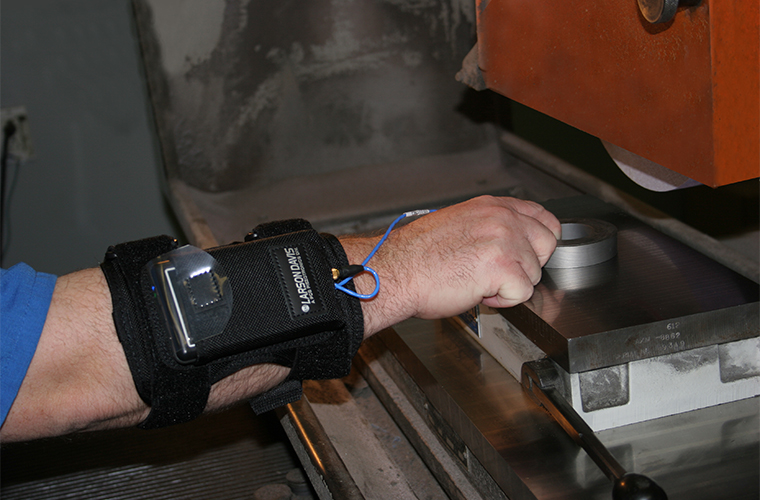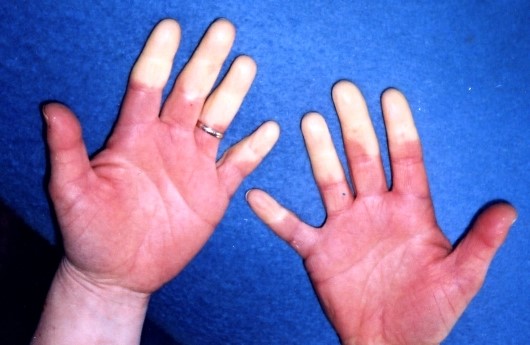Main Menu
- Home
- Products
- Applications
- Product Support
- Service
- Learn
- Product News
- About Us
- Contact Us
Everyday human beings interact with some sort of machinery, making contact with vibration inevitable. Unfortunately, continuous exposure to mechanical vibration can lead to serious injury. The effect on the human body is dependent upon the magnitude of vibration, the frequency content, and the duration of exposure.
 Understanding Hand-Arm Vibration
Understanding Hand-Arm VibrationHand-Arm Vibration is defined as the vibration workers experience when using tools such as chain saws, jackhammers, grinders, drills, etc. Excessive Hand-Arm Vibration can lead to what is commonly referred to as Hand-Arm Vibration Syndrome (HAVS).
Hand-Arm Vibration Syndrome is a general term used to broadly describe the physical damage to the hands, fingers, and related structures resulting from chronic exposure to excessive vibration (also known as Vibration White Finger or VWF).

Physical Damage Includes:
Some questions that can be used to help determine areas for HAVS concern:
A) Are power tools being used and is there a medical diagnosis of injury?
B) Are workers reporting tingling or a "pins and needles" feeling in their fingers?
C) Has a case of HAVS been documented?
HAVS Exposure Limits
Vibration exposure limits have been established through European Directive 2002-/44/-EC and the American Conference of Industrial Hygienists (ACGIH). Limits for maximum exposure which are called the Threshold Limit Value (TLV) and action levels are shown below.
| ACGIH Threshold Limit Values (TLVs) | |
|---|---|
| Total Daily Exposure Duration | Maximum value of the frequency weighted acceleration |
| 4 to less than 8 hours | 4 m/s2 |
| 2 to less than 4 hours | 6 m/s2 |
| 1 to less than 2 hours | 8 m/s2 |
| Less than 1 hour | 12 m/s2 |
| EU Directive 2002-/44/-EC Limit and Action Levels | ||
|---|---|---|
| Daily Exposure Duration | Daily Limit | Daily Action Level |
| 8 hours | 5 m/s2 | 2,5 m/s2 |
It is possible to measure and report the vibration levels produced by handheld equipment using products such as the Larson Davis Human Vibration Meter Model HVM200. The HVM200 provides all the functionality needed to measure human exposure to vibration
In Europe, Directive 202/44/EC has been implemented to define "exposure limits" and "exposure action values". This specifies an employer's obligations with regard to determining and assessing risks. Also, Machinery Directive 98/37/EC requires anyone providing
power tools or machinery for use in Europe must provide vibration exposure data.
In the US, OHSA has not regulated specific requirements for vibration standards. However, the American Conference of Governmental Industrial Hygienists (ACGIH) has developed Threshold Limit Values (TLV's) for vibration exposure and advises that these
values be applied in conjunction with other protective measures. As mentioned above, any manufacturer providing equipment to Europe must comply with the Machinery Directive.
Some of the ISO standards related to Hand-arm vibration are listed below:
| International Standards | |
|---|---|
| Standard | Description |
| ISO 8041:2005 | Standard for instruments measuring human response to vibration |
| ISO 5349-1:2001 | General requirements for measuring human exposure to hand-transmitted vibration |
| ISO 5349-2:2001 | Practical guidelines for measuring human exposure to hand-transmitted vibration at the workplace |
| ISO 10819:2013 | Measurement and evaluation of gloves |
| ISO 22867:2011 | Vibration of portable, hand-held tools used in forestry and gardening |
| ISO 28927-1:2009 | angle and vertical grinders |
| ISO 28927-2:2009 | Wrenches, nut runners and screwdrivers |
| ISO 28927-3:2009 | Polishers and rotary, orbital and random orbital sanders |
| ISO 28927-4:2010 | Straight grinders |
| ISO 28927-5:2009 | Drills and impact drills |
| ISO 28927-6:2009 | Rammers |
| ISO 28927-7:2009 | Nibblers and shears |
| ISO 28927-8:2009 | Saws, polishing and filing machines with reciprocating action and small saws with oscillating or rotating action |
| ISO 28927-9:2009 | Scaling hammers and needle scalers |
| ISO 28927-10:2011 | Percussive drills, hammers and breakers |
| ISO 28927-11:2011 | Stone hammers |
| ISO 28927-12:2012 | Die grinders |